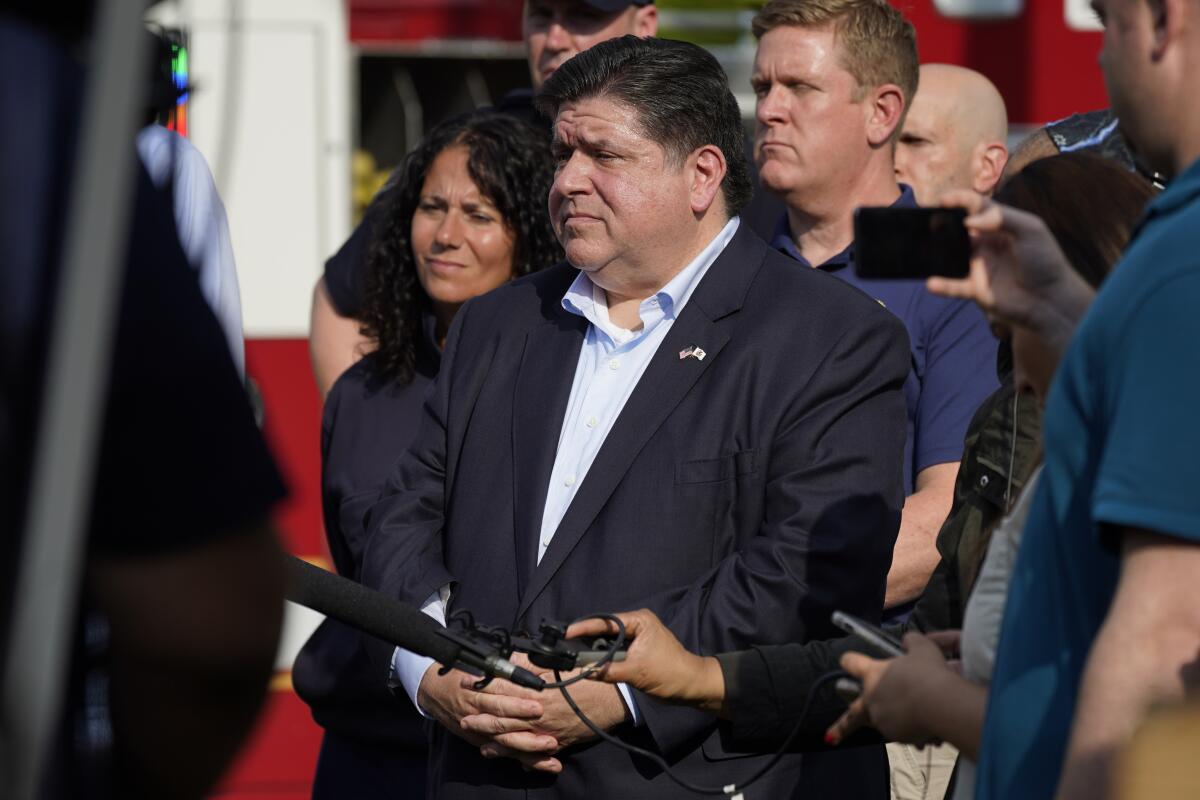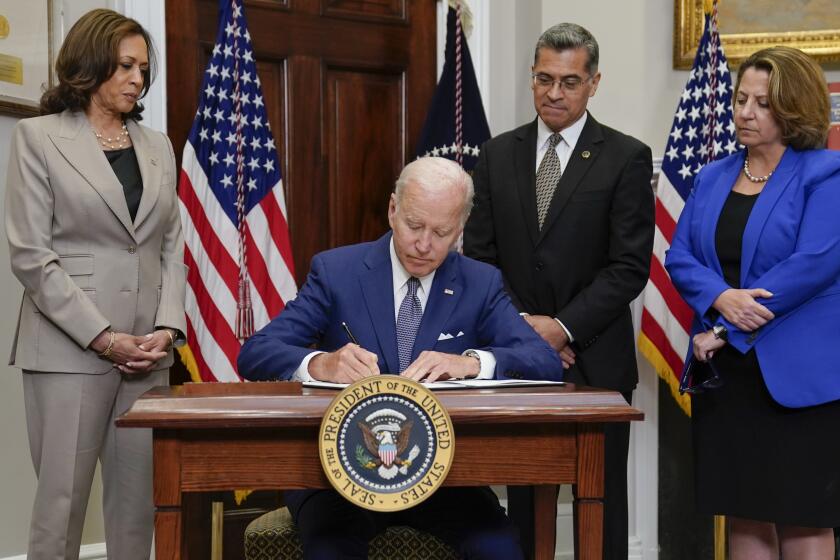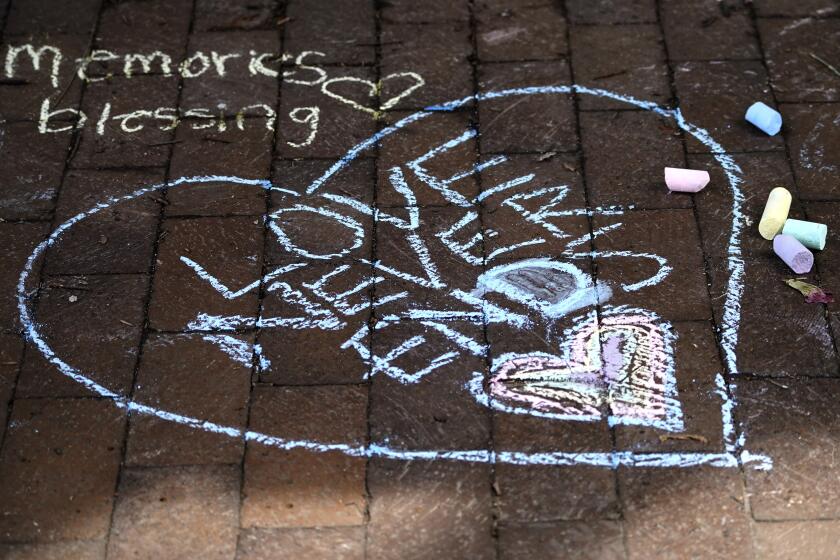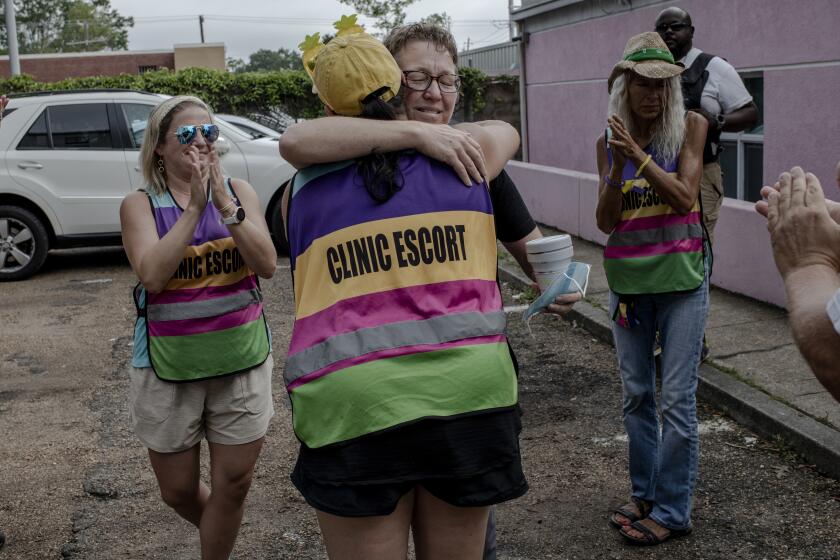Democratic governors offer aggressive reply to Supreme Court rulings on guns and abortion

- Share via
NEW YORK — Hours after a gunman killed seven people at a Fourth of July parade in suburban Chicago, Illinois Gov. J.B. Pritzker tapped into the frustration of many fellow Democrats at the seeming inability of the U.S. to curb gun violence.
“If you’re angry today, I’m here to tell you: Be angry. I’m furious,” Pritzker said.
But at the White House, President Biden was more focused on reassurance than anger.
“I know it can be exhausting and unsettling,” he said, adding, “We’re going to get through all of this.”
In a summer marked by anger among Democrats over a string of mass shootings and the Supreme Court’s decision to strip women of the constitutional right to an abortion, several governors, including Pritzker, are emerging as the party’s leading voices of outrage. Their willingness to speak — and act — in aggressive terms stands in contrast to Biden, who is coming under growing criticism from some Democrats, who are calling for more robust responses to what they see as existential threats.
Some Democrats warn that the lack of a strong response will be a problem if the party hopes to turn out enough voters to maintain their narrow grip on Congress in the fall midterm elections.
President Joe Biden signed an executive order to protect access to abortion as he faced mounting pressure from fellow Democrats to be more forceful on the subject.
“The people that you’re telling to vote aren’t going to listen until we prove that we are handling this moment with urgency,” Rep. Alexandria Ocasio-Cortez (D-N.Y.) said in an interview, referring to the party generally. “We have a lot of tools at our disposal — I think we have a lot of assets at our disposal — and we have to use them.”
Facing pressure to be more forceful, Biden took executive action Friday to protect access to abortion, but noted the limits of what he could do without Congress acting, and said, “For God’s sake, there is an election in November. Vote. Vote. Vote. Vote!”
But in this moment, governors may have unique tools that are more conducive to swift action than the president. Well positioned heading into the fall campaign and presiding over statehouses where Democrats are in control, Pritzker and Govs. Kathy Hochul of New York and Gavin Newsom of California have wide latitude.
In New York, for instance, Hochul was undeterred by a U.S. Supreme Court ruling last month that struck down a state law and allowed most people to carry a handgun for personal protection. She quickly called a special session of the Legislature in which lawmakers passed new measures limiting where those licensed to have guns can carry them and toughening rules for obtaining the permits. The regulations include a novel requirement to screen applicants’ social media accounts for threats.
Mourners are remembering a former synagogue preschool teacher who was among the 7 people killed when a gunman opened fire on a July Fourth parade near Chicago.
“They may think they can change our lives with the stroke of a pen, but we have pens too,” Hochul said defiantly of the Supreme Court’s gun ruling.
In Illinois, Pritzker has said he will convene a special legislative session soon with the support of Democratic legislative leaders, to “more firmly protect” abortion rights and address some of the challenges the state faces as one of the few places in the Midwest where abortion remains legal.
And abortion rights will be on the California ballot in November after legislators, with Newsom’s blessing, agreed last month to place a proposal before voters to guarantee abortion rights in the state Constitution. The proposed constitutional amendment is certain to drive turnout on both sides of the debate.
Newsom has been especially vocal in rallying against the repeal of abortion rights even before the Supreme Court ruled. When a draft of the abortion opinion surfaced in May indicating that the conservative majority was poised to overturn Roe vs. Wade, Newsom delivered a withering critique of the national party, suggesting it was suffering from collective lethargy.
Dubbed ‘The Pink House’ for its bubblegum-pink exterior walls, this clinic has long been the epicenter of the nation’s fight over abortion
“Where is the Democratic Party?” he asked without naming anyone specifically or singling out Biden. “Why aren’t we standing up more firmly? More resolutely? Why aren’t we calling this out?”
With the party’s tenuous grip on Congress, however, Biden can’t move legislation quickly. And even criticizing Republicans could be politically dangerous if he needs their support on key votes.
“Forcefully calling out the other side isn’t a luxury he has if he wants to get anything done the rest of the year on anything,” said Democratic strategist Joe Trippi. “If you’re Gavin Newsom, whose votes are you going to lose in the state Senate or California Assembly?”
The White House maintains that Biden isn’t backing away from a fight. In a passionate prime-time speech last month, he lamented that gun violence had turned schools, supermarkets and other everyday places into “killing fields,” and asked, “How much more carnage are we willing to accept?”
Shortly after the Supreme Court’s abortion ruling, Biden called the decision the “realization of an extreme ideology and a tragic error.”
White House Press Secretary Karine Jean-Pierre said Thursday that the nation “will hear more from him” on issues including abortion, as she underscored the administration’s central message that winning the midterms is the best path forward.
Speaking at the White House on Friday about the abortion ruling, Biden showed anger and disgust, at times gritting his teeth as he discussed reports of a 10-year-old Ohio girl who was forced to travel out of state to terminate a pregnancy after she was raped.
“Ten years old. Ten years old. Raped. Six weeks pregnant. Already traumatized, was forced to travel to another state. Imagine being that little girl. Just — I’m serious — just imagine being that little girl. Ten years old!” he said.
Still, without more options at the federal level, Biden is turning to governors. He convened a virtual roundtable July 1 with Pritzker, Hochul and seven other Democratic governors to discuss steps being taken in their states to protect abortion rights.
Biden reiterated that his administration would protect the rights of women to travel to other states for abortion services, and would ensure that abortion medication is available as widely as possible. But he acknowledged that he didn’t have enough votes in the Senate for more sweeping actions, and laid out the stakes for November’s elections and the need to increase Democrats’ majorities in Congress.
“In the meantime, I want to hear what the governors are doing,” he said.
The aggressive action from some governors whose reelections are essentially secure is sparking speculation about potential future presidential campaigns.
Pritzker, a billionaire businessman seeking his second term in Illinois, raised chatter about a possible presidential bid when he spoke last month at a convention of the state Democratic Party in New Hampshire, one of the early presidential nominating states. He has said, however, that he is focused on his job as governor and his reelection bid.
Newsom drew even more attention by running a television ad this week in Florida that was critical of Republican Gov. Ron DeSantis, a potential 2024 presidential candidate. In the ad, which features images of DeSantis and former President Trump, Newsom warns viewers that “freedom is under attack in your state.”
“I urge all of you living in Florida to join the fight. Or join us in California, where we still believe in freedom — freedom of speech, freedom to choose, freedom from hate and the freedom to love,” Newsom said.
More to Read
Get the L.A. Times Politics newsletter
Deeply reported insights into legislation, politics and policy from Sacramento, Washington and beyond. In your inbox three times per week.
You may occasionally receive promotional content from the Los Angeles Times.













